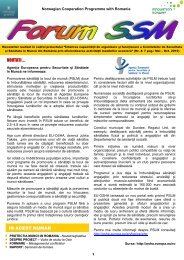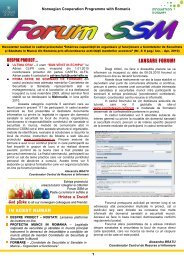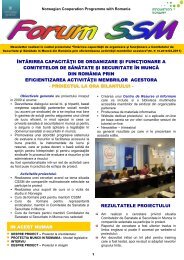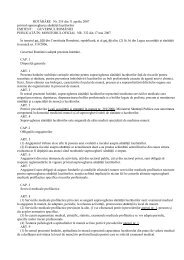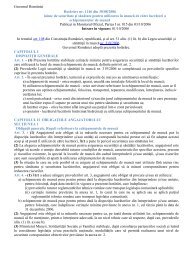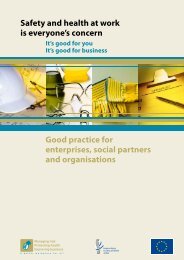Preventing work-related musculoskeletal disorders - European ...
Preventing work-related musculoskeletal disorders - European ...
Preventing work-related musculoskeletal disorders - European ...
You also want an ePaper? Increase the reach of your titles
YUMPU automatically turns print PDFs into web optimized ePapers that Google loves.
<strong>Preventing</strong> <strong>work</strong>-<strong>related</strong> <strong>musculoskeletal</strong> <strong>disorders</strong><br />
JASON DEVEREUX<br />
<strong>European</strong> Agency Topic Centre on Good Practice (MSDs), Lead Organisation Robens Centre for Health Ergonomics, University of Surrey, U.K<br />
w ork-<strong>related</strong> stress and MSDs: is there a<br />
link?<br />
Work-<strong>related</strong> stress and <strong>musculoskeletal</strong><br />
<strong>disorders</strong> are the two leading occupational illhealth<br />
problems in the <strong>European</strong> Union and<br />
have also become a major medical problem.<br />
The second <strong>European</strong> survey on <strong>work</strong>ing conditions produced some<br />
indication of the magnitude of these two health problems.<br />
Musculoskeletal complaints were the highest reported ill-health<br />
problem followed by health affected by stress at <strong>work</strong>.<br />
Understanding the factors that lead to the development of these<br />
two conditions is important for prevention and rehabilitation. Both<br />
stress and <strong>musculoskeletal</strong> <strong>disorders</strong> have been scrutinised in recent<br />
publications of the <strong>European</strong> Agency for Safety and Health at Work.<br />
The report on <strong>work</strong>-<strong>related</strong> stress by Professor Tom Cox et al and the<br />
report on <strong>work</strong>-<strong>related</strong> neck and upper limb <strong>musculoskeletal</strong><br />
<strong>disorders</strong> by Professor Peter Buckle and Dr. Jason Devereux include<br />
risk factors for the condition considered in each report.<br />
Both reports make reference to physical and psychosocial <strong>work</strong>place<br />
risk factors. In particular, similar psychosocial factors in the<br />
<strong>work</strong>place were mentioned in both reports, for example perceived<br />
<strong>work</strong> demands and job control, which appear to increase risk of<br />
both stress and <strong>musculoskeletal</strong> <strong>disorders</strong>.<br />
However, what is unclear at present is the role of <strong>work</strong>-<strong>related</strong> stress<br />
reactions in the development of <strong>musculoskeletal</strong> <strong>disorders</strong>.<br />
CAUSE OR EFFECT?<br />
There is evidence to support a relationship between stress reactions<br />
and <strong>musculoskeletal</strong> <strong>disorders</strong> but it is difficult to conclude whether<br />
stress reactions are significantly involved in the development of<br />
<strong>musculoskeletal</strong> <strong>disorders</strong> or whether those with <strong>musculoskeletal</strong><br />
<strong>disorders</strong> simply experience stress reactions due to the experience of<br />
pain and functional impairment.<br />
There are plausible mechanisms to support the relationship between<br />
<strong>work</strong> stress and <strong>work</strong>-<strong>related</strong> <strong>musculoskeletal</strong> <strong>disorders</strong>. Being<br />
exposed to physical and psychosocial <strong>work</strong> risk factors and their<br />
potential interaction effects may result in certain biological reactions<br />
that can exacerbate the effects of physical strain. These stress<br />
reactions may limit the ability of the body’s defences and repair<br />
systems to deal with <strong>musculoskeletal</strong> damage, therefore, it can take<br />
longer to recover from <strong>work</strong>.<br />
Behavioural and emotional stress reactions may increase exposure to<br />
<strong>work</strong>place risk factors for <strong>musculoskeletal</strong> <strong>disorders</strong>. For example, a<br />
delivery driver may handle boxes very rapidly because of a stress<br />
reaction to time pressure, thus, placing excessive physical strain on<br />
the body because of the excessive speed of movement and the<br />
excess tension brought about by the stress reaction. Finally stress<br />
reactions may increase the psychological and physical sensitivity to<br />
pain.<br />
STRESS STUDY<br />
The Robens Centre for Health Ergonomics, University of Surrey, U.K.<br />
is currently conducting a large scale study of 7000 <strong>work</strong>ers to<br />
investigate the role of <strong>work</strong> stress reactions upon the development<br />
of <strong>work</strong>-<strong>related</strong> <strong>musculoskeletal</strong> <strong>disorders</strong>. The three-year study<br />
commenced on the 1 st April 2000 and is funded by the Health and<br />
Safety Executive in the U.K.<br />
The study will follow a cohort of <strong>work</strong>ers without <strong>musculoskeletal</strong><br />
<strong>disorders</strong> over 14 months. It will determine whether those with<br />
severe <strong>work</strong> stress reactions at the beginning of the 14-month<br />
follow-up period are more at risk of developing <strong>musculoskeletal</strong><br />
disorder symptoms compared to those with no significant indicators<br />
of <strong>work</strong> stress reactions at the start of the follow-up period.<br />
Potential interaction effects between physical and psychosocial <strong>work</strong><br />
risk factors will also be measured as such an effect has been shown<br />
to increase the risk of <strong>musculoskeletal</strong> <strong>disorders</strong>.<br />
It is important in this study to make a distinction between what<br />
researchers believe to be the cause-effect relationships of stress and<br />
what ‘lay people’ believe regarding the role of stress. People’s beliefs<br />
about the causes, manifestations, consequences and alleviation of<br />
<strong>work</strong> stress may affect behaviours such as vocational choice and<br />
reporting <strong>work</strong> stress. For example, if an individual believes that<br />
their stress is because of their weak nerves then that person may not<br />
seek the appropriate support from managers, colleagues etc. in<br />
order to help overcome the stressors. Therefore, elucidating how<br />
people react to situations that they regard as stressful or what their<br />
expectations may be of <strong>work</strong> stress may play an important role in the<br />
development of <strong>musculoskeletal</strong> <strong>disorders</strong>.<br />
The research project is the first longitudinal study to investigate<br />
beliefs of <strong>work</strong> stress in the context of <strong>musculoskeletal</strong> <strong>disorders</strong> and<br />
also interactions between physical and psychosocial <strong>work</strong>place risk<br />
factors. The objective of the study is to produce results that are of<br />
vital importance for the management of both <strong>work</strong> stress and <strong>work</strong><strong>related</strong><br />
<strong>musculoskeletal</strong> <strong>disorders</strong>.<br />
For further information visit<br />
http://www.eihms.surrey.ac.uk/robens/erg/stress.htm.<br />
<br />
<strong>European</strong> Agency for Safety and Health at Work<br />
19



